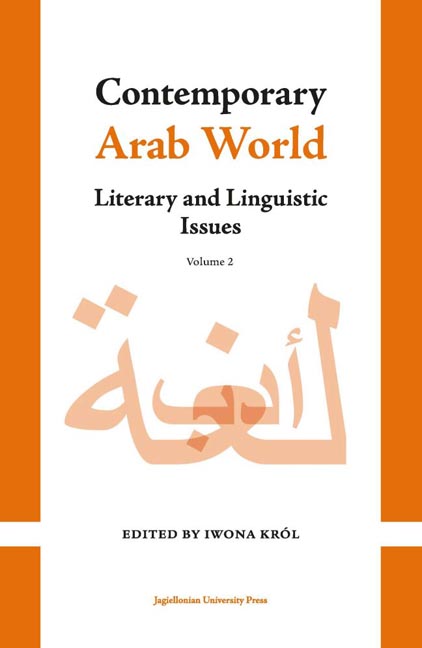Book contents
- Frontmatter
- Contents
- Introduction
- Karīm Maʿtūq and Other Winners of Amīr ash-shuʿarāʾ (Prince of Poets) First Contest
- Muḥammad Ibn Dāniyāl al-Mawṣilī – Arabic Aristophanes of Shadow Theatre
- Connotations of Home in Contemporary Palestinian Poetry – ʿAbd Allāh ʿĪsā’s Texts as an Example
- The “Mad Arab” Abdul Alhazred – Orient and Orientalism in the Works of Howard Phillips Lovecraft
- Functions of the Suffix -at in Nouns in Modern Standard Arabic
- Some Remarks on the Nature of Moroccan Regionalisms Based on the Analysis of University Admission Announcements
- Polish Deverbal Verbs and Their Hebrew Equivalents – A Contrastive Analysis Outline
- Annex: Abstracts – Streszczenia
- Miscellaneous Endmatter
Muḥammad Ibn Dāniyāl al-Mawṣilī – Arabic Aristophanes of Shadow Theatre
Published online by Cambridge University Press: 13 October 2023
- Frontmatter
- Contents
- Introduction
- Karīm Maʿtūq and Other Winners of Amīr ash-shuʿarāʾ (Prince of Poets) First Contest
- Muḥammad Ibn Dāniyāl al-Mawṣilī – Arabic Aristophanes of Shadow Theatre
- Connotations of Home in Contemporary Palestinian Poetry – ʿAbd Allāh ʿĪsā’s Texts as an Example
- The “Mad Arab” Abdul Alhazred – Orient and Orientalism in the Works of Howard Phillips Lovecraft
- Functions of the Suffix -at in Nouns in Modern Standard Arabic
- Some Remarks on the Nature of Moroccan Regionalisms Based on the Analysis of University Admission Announcements
- Polish Deverbal Verbs and Their Hebrew Equivalents – A Contrastive Analysis Outline
- Annex: Abstracts – Streszczenia
- Miscellaneous Endmatter
Summary
Despite a number of researches and studies led by successive generations of specialists, it has not been possible to determine in what circumstances and when shadow theatre performances first reached the Arab world. The main obstacle to establishing these facts is a very small number of written accounts that would be the key point of reference in the debate on this issue. The oldest known historical sources referring to shadow theatre in the Egyptian context date back to the Fatimids. One example is the work of an eleventh-century optician Ibn al-Hayṯam, in which the author confirms the presence of this form of art. Nonetheless, it is the account of Ibn Ḥiǧǧa al-Ḥamāwī’s which clearly states that in 1171 a shadow theatre performance was watched by Ṣalāḥ ad-Dīn al-Ayyūbī in the company of his minister al-Qādi al-Fāḍil. Ibrāhīm Ḥamāda in his monograph titled Ḫayāl aẓ-ẓill wa-tamṯīliyyāt Ibn Dānyāl (Shadow Theatre and Ibn Dāniyāl’s Plays) mentions that during the Fatimid dynasty, the shadow theatre was present both at court and in the street among the lower social classes. He also suggests that it might have appeared at the end of the tenth century as a new phenomenon. ʿAlī Ibrāhīm Abū Zayd, on the other hand, is of the opinion that this form of art was originally intended only for the court, and it gradually grew more and more popular over the years, to the point that it became a very important part of local folklore. The author of the monograph titled Tamṯīliyyāt ḫayāl aẓ-ẓill (Shadow Theatre Plays) believes that the Fatimid rulers, known for their wealth and affinity for art, could attract groups of shadow theatre artists who, together with merchants, sought a source of income for themselves in wealthy mansions by offering new and interesting entertainment.
Ibn Ḥiǧǧa al-Ḥamāwī’s account says that al-Qāḍī al-Fāḍil approached the idea of watching the shadow theatre with some reservations and it was only the encouragement of Ṣalāḥ ad-Dīn which persuaded him to participate in the performance. However, after the show was finished, he rated it very positively.
- Type
- Chapter
- Information
- Contemporary Arab WorldLiterary and Linguistic Issues, pp. 25 - 38Publisher: Jagiellonian University PressPrint publication year: 2022



